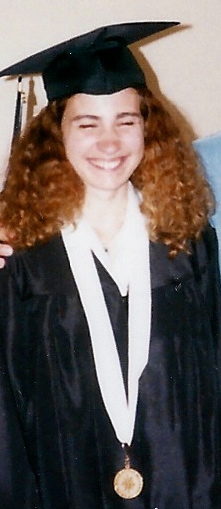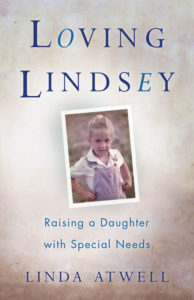It can be distressing when your teenage son or daughter starts having sex, but it can be even more so when your child is special needs.
John and I talked to Lindsey about sex—extensively—because her curiosity about the subject was immense. Answers to questions were doled out truthfully, but limited to age appropriate explanations. When she became a teenager, we encouraged, “Wait until you are married.” Isn’t that what good, responsible parents say? But we weren’t sure she’d wait; nor that she’d marry.
A family member gave Lindsey a purity ring for her 13th birthday. When my daughter slid the gold band down her slender finger, she promised God that she’d remain celibate until her wedding day. She showed the ring to everyone she met and wasn’t shy about telling the neighbor boy, an aunt, the man at the mall—all about her promise. In shocking detail—even though we lectured over and over, which issues were appropriate to discuss publicly and which were not. Then she lost the ring. And Lindsey no longer felt she had to keep that promise.
How does a parent stop their teenager—mentally healthy or mentally challenged—from engaging in sex? Human beings want to be loved and touched. It feels good to kiss and hug and snuggle and hold hands. But in today’s society there is a lot of pressure to “give in,” or “put out.” A parent can’t lock their child up or be with them 100% of the time. (Who would want that anyway?) Even after hours of sex education discussions, we still found that Lindsey didn’t associate any harm to acting upon her desires.
 We were lucky. Lucky in the sense that Lindsey didn’t engage in sexual intercourse until two weeks after her high school graduation. Lucky that she was nineteen. Lucky that her first sexual encounter was with a young man she liked from her special education class at Silverton High. Lucky that she didn’t end up pregnant. And real lucky that she didn’t contract any sexually transmitted diseases.
We were lucky. Lucky in the sense that Lindsey didn’t engage in sexual intercourse until two weeks after her high school graduation. Lucky that she was nineteen. Lucky that her first sexual encounter was with a young man she liked from her special education class at Silverton High. Lucky that she didn’t end up pregnant. And real lucky that she didn’t contract any sexually transmitted diseases.
But we weren’t lucky that her decision to engage in sex occurred when John and I were out of town, or that she told me of her escapades over the phone, or that she couldn’t remember if they’d used a condom. In fact, her actual words were: “Either he was too big or I was too small, but it didn’t work so well.” My hope: Maybe it didn’t work at all! But after a frantic interrogation, I realized everything had worked. Quite well. And Lindsey liked sex. She wanted more.
What I learned was that my daughter did not require a lot of courting. Dating was not a high priority. For Lindsey, (I don’t want to put all special needs in this category, but I’ve heard other mothers share similar stories) sex moved onto the agenda rather quickly. The conversation could be as simple as, “Hey, I like you. Do you like me? You wanna have sex?”
The complete tale of Lindsey’s first sexual encounter and how we handled it will appear in my book, Out One Ear And Through The Other. A version of this event was recently published in Perceptions Literary Magazine, titled: Swing, Drive, Sex.
If you are interested in ordering this publication, please contact Perceptions Magazine Of The Arts or Jonathon Morrow at 503/491-7147. Swing, Drive, Sex begins on page 125.
Special needs individuals have the same sensual urges as anyone else. I’d encourage you to educate your children—whether they are mentally healthy or mentally challenged—about sex. A special needs child is vulnerable to sexual abuse, predators, and peer pressure as much, maybe even more so, than children of average intelligence. The Lindsey’s of the world don’t often understand or know the words to fully explain or tell someone of an encounter.
So how did we handle the news that our daughter had sex? That will be discussed in an upcoming blog. Please stay tuned. In the meantime, if you have any advice on how to keep your children (special needs or not) from participating in sexual activities before they are ready, do tell. And if you enjoy the blog, please spread the word–share the link with your friends and family.
If you’d like to learn more about sex education for physically, emotionally, and mentally challenged youth, check out Advocates For Youth.
 My first book, Loving Lindsey: Raising a Daughter with Special Needs will be out September 26, 2017. If you would like to learn more, click here.
My first book, Loving Lindsey: Raising a Daughter with Special Needs will be out September 26, 2017. If you would like to learn more, click here.
Every month, one or two organizations that do great things for people with special needs will be featured here. If you would like to support the developmentally disabled, please check these out.
Albertina Kerr helps children, adults and families in Oregon with mental health challenges and developmental disabilities, empowering them to lead fuller, self-determined lives. They were recently named Oregon’s 2nd most admired non-profit organization. If you would like to learn more about their services, volunteering, or donating, please click on above link.
Special Olympics services 4 million athletes worldwide with developmental disabilities. If you would like to learn more about how you might support this organization, please click on above link.

